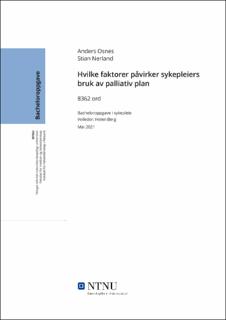| dc.contributor.advisor | Berg, Helen | |
| dc.contributor.author | Nerland, Stian | |
| dc.contributor.author | Osnes, Anders | |
| dc.date.accessioned | 2021-09-25T16:43:50Z | |
| dc.date.available | 2021-09-25T16:43:50Z | |
| dc.date.issued | 2021 | |
| dc.identifier | no.ntnu:inspera:82022565:82023790 | |
| dc.identifier.uri | https://hdl.handle.net/11250/2783399 | |
| dc.description.abstract | Hensikten med studien var å undersøke ulike faktorer som kan påvirke bruken av palliativ plan blant sykepleiere i kommunehelsetjenesten.
Norge er blant landene med lavest hjemmedød sammenlignet med andre vestlige land. Bare 15 % dør hjemme og andelen er stabil. Høy andel hjemmedød indikerer palliative tjenester av god kvalitet.
Det ble brukt kvantitativ metode i oppgaven.Til sammen responderte 73 sykepleiere med bred erfaring, fordelt mellom 38,4 % fra sykehjem og 61,6 % fra hjemmesykepleien. Datamaterialet ble systematisk analysert ved bruk av SPSS.
Tre hovedfunn ble identifisert; 1) Hvordan opplæring og videreutdanning kan føre til økt bruk av palliativ plan, 2) At mangel på tid og en travel hverdag kan true sykepleiers mulighet til å utarbeide gode palliative planer og 3) Hvordan kommunikasjon og samhandling påvirker arbeidet rundt palliativ plan.
Sykepleierne opplever palliativ plan som et godt hjelpemiddel til beslutningsstøtte i hverdagen, med flere positive sider. Likevel kan vi se et forbedringspotensial knyttet til bruken av planer. | |
| dc.description.abstract | The purpose of the study was to examine various factors that may influence the use of palliative care among nurses in the municipal health service.
Norway is among the countries with the lowest at-home deaths relative to other western countries. Only 15 % die at home,and the numbers are steady. A high number of at-home deaths indicates high quality palliative care services.
A quantitative method was used in this thesis. A total of 73 nurses with broad experience responded; 38.4 % of them working at nursing homes and the remaining 61.6 % working at the community nursing services. The data material was systematically analysed using SPSS.
Three main findings were identified; 1) How training and continuing education can lead to increased use of palliative care plans, 2) Lack of time and high work loads can hinder nurses ability to implement good palliative care plans and 3) How communication and interaction affect the work surrounding the palliative care plan.
Nurses in this study considered the use of palliative care plans to be helpful, and a good decision-making tool. Nevertheless, we can see a potential for improvement related to the use of plans. | |
| dc.language | nob | |
| dc.publisher | NTNU | |
| dc.title | Hvilke faktorer påvirker sykepleiers bruk av palliativ plan | |
| dc.type | Bachelor thesis | |
